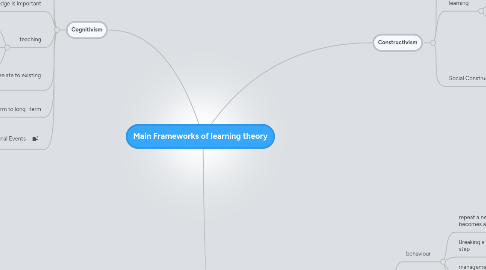
1. Cognitivism
1.1. learners build internal conceptual frameworks
1.2. based on thought process behind behaviour
1.3. memory system
1.3.1. active
1.3.2. organized processor
1.4. prior knowledge is important
1.5. teaching
1.5.1. asking interesting questions
1.5.2. use multi-media to attract attention
1.5.3. present content
1.6. highlight important points and relate to existing knowledge
1.7. moving knowledge from short-term to long -term
1.7.1. rehearsal
1.7.2. feedback
1.8. Gagne's 9 Instructional Events
2. Behaviorism
2.1. learning links between our behaviour and reinforcement
2.1.1. behaviour
2.1.1.1. repeat a new behavioral pattern being until it becomes automatic
2.1.1.2. Breaking a task down into a series of simple step
2.1.1.3. management of class behaviour is important
2.1.1.4. Tutorial software
2.1.2. reinforcement
2.1.2.1. A variety of reinforcements to change student behaviour
2.1.2.1.1. rewards
2.1.2.1.2. punishment
2.1.2.2. Drill and practice software
3. Constructivism
3.1. knowledge
3.1.1. actively constructed by mind of learners
3.1.2. constructed from experience
3.2. learning
3.2.1. a personal interpretation of world
3.2.2. an active process
3.2.2.1. meaning developed on the basis of experience
3.3. Social Constructivism
3.3.1. knowledge is not transmitted by actively built up by learners over time
3.3.2. Salmon Model
3.3.2.1. Access and motivation
3.3.2.2. Online socialisation
3.3.2.3. Information exchange
3.3.2.4. Knwoledge construction
3.3.2.5. Development
